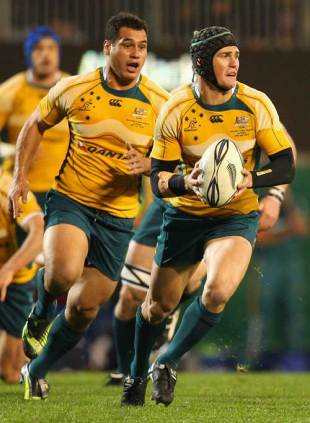|
Comment
Wallabies pay for lack of killer instinct
Keiran Smith
July 20, 2009

Wallabies centre Berrick Barnes cuts through the All Blacks' defence during their Eden Park clash
© Getty Images
Enlarge
It was a case of what could have and perhaps should have been for the Wallabies in their first Tri-Nations/Bledisloe encounter in Auckland on Saturday. It's a defeat that rankles more than others as this was the opportunity to get that elusive win in the haunted house of Eden Park. Australia went in with good wins over Italy and France under their belts, while the All Blacks had a host of players missing in action and a Richie McCaw starved of match fitness. The stars all pointed to the end of the hoodoo but yet again the Wallabies will return with nothing. It also means the Wallabies now have next to no hope of winning back the Bledisloe for the first time since 2002, despite the fact there are three games yet to play. With New Zealand only needing to win once more to retain the trophy, the Wallabies face the Herculean task of needing to win in Sydney, Wellington and Tokyo to reclaim it. But how Saturday night could have been so different if the Wallabies had shut the door on a shell shocked All Blacks in a dominant opening spell. In the pre-game telecast former Australian hooker, now TV pundit, Phil Kearns spoke of defining moments in Bledisloe Tests. With these matches so tightly contested, Kearns was referring to that one definitive moment which turns the match in your favour. That moment appeared inside the opening 20 minutes as Berrick Barnes exploited an unbelievable piece of skill by Matt Giteau to re-gather a loose ball. With options left and right a try to take the Wallabies 14 points clear appeared a formality but, inexplicably, the pass never came and the chance was lost. With arms clutched to your head in disappointment, you knew the Wallabies would be made to regret the error and not long after Richie McCaw (who else) dragged his team back into the contest with yet another Bledisloe try. It was a bitter pill to swallow as the Wallabies should have been leading by 14 points and well on track to end 23-years of misery and trauma in the City of Sails. But this is a recurring problem. Despite the significant progress made since Robbie Deans' arrival last year, the Wallabies need to have the conviction to take the opportunities presented to them and "kill" teams off. The current Wallabies crop has the bones of a great Australian side, now they need the mindset to match. Great teams across all sports know when to make that killer blow, the moment to capitalise on their strength and dominance to claim victory. Their skill is only matched by their strength of character to do what must be done to win. I don't think anyone could confidently say the Wallabies are in that head space yet, but that is where they will need to be to win the RWC at the same stadium in two years time. A win in Auckland would have also helped the Wallabies and ARU put a line under the Lote Tuqiri saga. Despite the protestations from the Wallabies group that the shock sacking would not distract them in the lead-up to the Test, it's hard to believe they enjoyed an ideal preparation either, especially considering the cloak of silence behind the affair. Tuqiri, a 67-Test player, was at one-time the most dominant and dynamic winger in the code. It didn't matter which stadium he played around the country, whenever he took possession in the back field a sense of anticipation and excitement would take hold of the crowd.
Off the field he has been the face of Australian Rugby for almost decade. He is one of only a few instantly recognisable rugby figures in Australian sport and fittingly his image rights would have been a fair chunk of his (now terminated) contract. However, the Wallabies evolution had already seen the end of Lote before this season's internationals. In truth, the writing was on the wall last November when Tuqiri barely made an appearance on the Spring Tour, with Deans preferring the speed of Mitchell, Ioane and Hynes to terrorise the Europeans. That's been Lote's fatal flaw, he's lost his speed in a position where having the fastest gun is how you make your living. The archetypal rampaging, bulky winger has been surpassed by a new lightning-quick generation that know how to find the try-line. That's not to say Lote will be short of offers for his services overseas as he will easily command big pounds/euros/yen from cashed up clubs in the northern hemisphere. His departure also marks the end of the ARU's original flirtation with rugby league and brings into question the long term benefit of poaching players at high expense to the detriment of developing junior talent. With Timana Tahu's switch proving ineffective and the provinces and heartland haemorrhaging under the weight of financial pressures, surely John O'Neill will be loathe to open the war chest in another raid on the league ranks anytime soon? © Scrum.com
| |||||||||||||||
Live Sports
Communication error please reload the page.
-
Football
-
Cricket
-
Rugby
-
- Days
- Hrs
- Mins
- Secs
F1 - Abu Dhabi GP
Abu Dhabi Grand Prix December 11-131. Max Verstappen ()
2. Valtteri Bottas (Mercedes)
3. Lewis Hamilton (Mercedes)
4. Alexander Albon ()
5. Lando Norris ()
6. Carlos Sainz Jr ()
-
ESPNOtherLive >>
Snooker - China Open
Tennis - Miami Open

